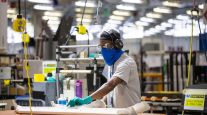Revised Second-Quarter Figures Show 1.1% GDP Growth
The U.S. economy grew less than previously reported last quarter on lower government outlays and a bigger depletion of inventories, capping a sluggish first-half performance propped up mainly by consumer spending.
Gross domestic product, the value of all goods and services produced, rose at a 1.1% annualized rate, down from an initial estimate of 1.2%, Commerce Department figures showed Aug. 26 in Washington. Household spending, the biggest part of the economy, was revised higher on used-car sales.
The economy’s failure to develop a sustained pickup has helped keep Federal Reserve policymakers from pulling the trigger on an interest-rate increase so far this year. Economists project a third-quarter rebound driven by household purchases and more stockpiling, and the report showed wages and salaries were revised sharply higher, indicating consumers have the wherewithal to continue spending.
“The only real area of strength was consumer spending,” David Sloan, senior economist at 4cast Inc. in New York, said before the report. At the same time, “the general view is that things are going to pick up in the third quarter.”
Republican presidential nominee Donald Trump has been trying to hammer home to voters the message that the economy can do better. Earlier this month, he blamed President Obama and Democratic nominee Hillary Clinton for policies that produced “the weakest so-called recovery since the Great Depression.”
The revised pace matched the median projection of economists surveyed by Bloomberg. Forecasts ranged from 0.9% to 2.8%. The economy grew at a 0.8% pace from January through March.
The latest estimate of GDP is the second of three for the quarter, with the next release scheduled for late September, after more information becomes available.
The Aug. 26 report offered a first look at corporate profits for last quarter. Before-tax earnings at companies decreased 1.2% after rising 3.4% in the first three months of the year. Profits fell 4.9% from a year earlier. A weakening profit picture casts a shadow over the outlook for already-sluggish business investment and possibly for hiring, which has been robust so far this year.
The biggest drivers of the updated estimate in second-quarter GDP were downward revisions in state and local government construction spending and to inventory investment and an upward revision to imports. These were partly offset by upward revisions to nonresidential fixed investment and to consumer spending, according to the Commerce Department.
Household consumption, the largest part of the economy, grew at a 4.4% annualized rate, the most since the end of 2014, which was higher than forecast and revised from an initial estimate of 4.2%. Purchases added 2.94 percentage points to GDP growth.
The report also included a large upward revision to second-quarter wage and salary data. Worker pay climbed by $92.6 billion, up $44.2 billion from the previous estimate. For the first three months of the year, wages and salaries were revised down by $3.1 billion to show a $13.4 billion drop.
Government spending fell at a 1.5% pace last quarter, more than the 0.9% previously estimated. State and local outlays decreased at a 2.2% annualized rate and subtracted 0.25 percentage point from growth, the most since the last three months of 2012.
Inventories shrank by an annualized $12.4 billion in the second quarter, subtracting 1.26 percentage points from GDP, the most in more than two years.
Inventories and the trade gap are two of the most volatile components in GDP calculations. To get a better sense of demand in the United States, economists watch final sales to domestic purchasers, which is GDP excluding inventories and net exports.
That gauge rose at a 2.2% rate in the April through June period, revised from an initially reported 2.1%. Final sales to private U.S. purchasers increased 3%.




